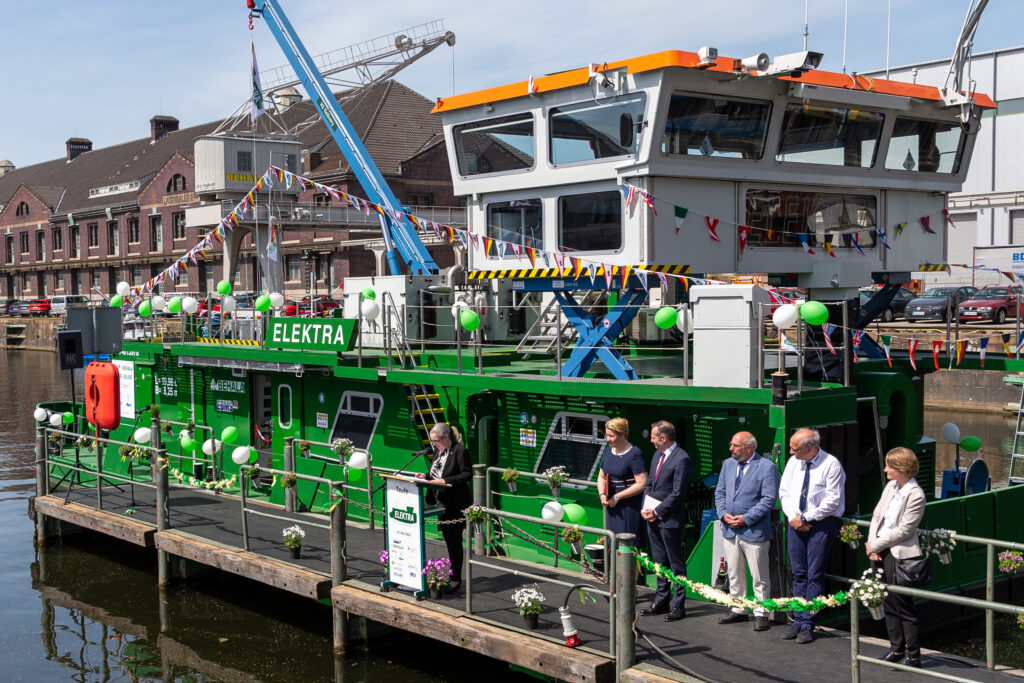Hermann Barthel has unveiled Elektra, the world's first towboat to feature hydrogen power and fuel cell technology. It built the push boat at a shipyard in Derben, Germany, over a period of almost two years. “The entire project is a blueprint for climate and environmentally friendly inland navigation and a true pioneering achievement, not only technically but also in regulatory terms,” said German Minister for Transport Volker Wissing.
Washington State University researchers have used an ethanol and water mixture in a novel conversion system with an anode and a cathode to produce pure compressed hydrogen. The process could reduce the cost of hydrogen transport. “Hydrogen could be made on site at fueling stations, so only the ethanol solution would have to be transported,” the researchers said. They put a small amount of electricity into the ethanol and water mixture with a catalyst, electrochemically producing pure compressed hydrogen. The project, funded by the Gas Technology Institute and the US Department of Energy's RAPID Manufacturing Institute, was recently described in Applied Catalysis A.
Iberdrola has commissioned Europe's largest green hydrogen production plant in Puertollano, Spain. It developed the project, which produces green hydrogen with a 20 MW electrolyzer, for Fertiberia. It includes a 100 MW solar array and four fully integrated 40-foot battery containers, as part of a 1.25 MW/5 MWh battery system supplied by Ingeteam.
UK Energy Storage (UKEn), a subsidiary of UK Oil & Gas, has signed a lease agreement with Portland Port Ltd. for two sites at the former Royal Navy port in Dorset, England. It aims to develop an integrated energy hub centered on hydrogen-ready gas storage and future green hydrogen-generating capabilities. The project builds upon an unrealized Portland Gas Storage plan for an underground salt cavern storage facility.
The Port of Tallinn in Estonia and Poland's Port of Gdynia Authority have signed a letter of intent to cooperate on hydrogen management. Gdynia wants to establish a hub to produce and store renewable hydrogen. It also aims to use hydrogen-based fuels to propel vessels. “Hydrogen will help Port of Tallinn create new value chains and economic opportunities and in doing so reach carbon neutrality,” said Valdo Kalm, CEO of the Port of Tallinn.
Renewable Energy Hub Flevoland is now set to supply 1 GW of sustainable energy to the Netherlands by 2030, as GIGA-Storage, EQUANS, Circul8 Energy, Smartgrid Flevoland, Solarvation, ACRRES and Wageningen University & Research have agreed to teamed up on its development. The hub will combine wind, solar, batteries and hydrogen. “In this way, power can be continuously supplied to the grid, even when the sun is not shining or the wind is not blowing,” said the provincial authorities in Flevoland, which aims to become the Dutch testing ground for storage solutions.
Corstyrene inaugurated its first two hydrogen stations on May 19 in Aléria, Corsica. The expanded polystyrene specialist has teamed up with green hydrogen producer Atawey to install an electrolyzer that will produce up to 1 ton of green hydrogen per year, powered by 100 kWp of solar shading systems.
This content is protected by copyright and may not be reused. If you want to cooperate with us and would like to reuse some of our content, please contact: editors@pv-magazine.com.


2 comments
By submitting this form you agree to pv magazine using your data for the purposes of publishing your comment.
Your personal data will only be disclosed or otherwise transmitted to third parties for the purposes of spam filtering or if this is necessary for technical maintenance of the website. Any other transfer to third parties will not take place unless this is justified on the basis of applicable data protection regulations or if pv magazine is legally obliged to do so.
You may revoke this consent at any time with effect for the future, in which case your personal data will be deleted immediately. Otherwise, your data will be deleted if pv magazine has processed your request or the purpose of data storage is fulfilled.
Further information on data privacy can be found in our Data Protection Policy.